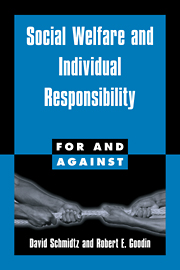1.3 - Responsibility and Community
Published online by Cambridge University Press: 05 June 2012
Summary
Sorting out individual contributions to cooperative ventures is a classic problem facing any attempt to distribute equitably the benefits of a communal enterprise. People being what they are, some see themselves as doing more than their share. In their eyes, other people are shirking. So they cut back. A co-worker sees them cutting back, she too cuts back in response, and the downward spiral has begun.
The problem is universal. Different forms of social organization embody different solutions. Some solutions are better than others. Large private firms face the same problem – how to identify and properly reward individual contributions. Finding answers that everyone can live with is not always easy, but it is not always difficult, either. The degree of ambiguity attaching to individual contributions depends on the nature of the institutional framework.
When ambiguity becomes a big problem, people invest in forms of social or corporate organization that make it easier to evaluate and quantify individual contributions. Private firms come up with answers accurate enough to meet their needs, if and when they perceive a need. Firms that become too big and cumbersome to monitor properly the connection between contribution and compensation tend to break up into smaller units with better internal accounting. Taking the costs and benefits of continued association into account, and not expecting perfection, employers and employees reach an understanding they can live with, or else they part company.
- Type
- Chapter
- Information
- Social Welfare and Individual Responsibility , pp. 44 - 59Publisher: Cambridge University PressPrint publication year: 1998



